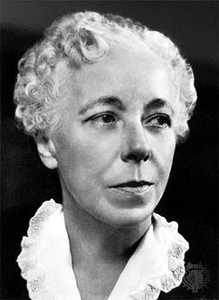She was born in September 16, 1885 and died in December 04, 1952. She is Specialized In sexuality. She married a law student Oscar Horney  in 1909. She graduated from university of Berlin in 1913 as a medical student. She taught psychoanalysis at university of Berlin and New York medical college. She is one of the most important psychoanalytic thinkers of the twentieth century. Her early work, in which she disagreed with Freud’s views on female psychology, established her as the first great psychoanalytic feminist. In her later years, she developed a sophisticated theory of her own which provided powerful explanations of human behaviour. Yet through these years of intellectual achievement, Horney struggled with emotional problems and depression.
in 1909. She graduated from university of Berlin in 1913 as a medical student. She taught psychoanalysis at university of Berlin and New York medical college. She is one of the most important psychoanalytic thinkers of the twentieth century. Her early work, in which she disagreed with Freud’s views on female psychology, established her as the first great psychoanalytic feminist. In her later years, she developed a sophisticated theory of her own which provided powerful explanations of human behaviour. Yet through these years of intellectual achievement, Horney struggled with emotional problems and depression.
Her Contributions to Psychology are: Self-psychology, Psychoanalysis and Feminine psychology
Is Karen Horney a Freudian? Like Freud, she believed in the importance of the unconscious motivation of sexual matters. She believed that Freud overstressed the subject of Biology. Her view of human beings and human behavior is more optimistic.
Family Dynamics -Karen has ongoing conflicts with her father even though she ended up marrying someone who shared some of the same authoritarian qualities. Berndt, her older brother was the preferred one and was very attached to Karen. She always felt that she was unwanted
Difference between Karen Horney & Sigmund Freud – Freud believed that personality is shaped by sexual (biological) development. Karen Horney believed that personality is shaped by environmental and social factors; non-sexual factors play a larger role in personality development.
Theory/ Interesting Facts– One of her best theory that exists today is Neurosis. She saw neurosis as an attempt to make life bearable, as a way of “interpersonal control and coping”. She identified ten neurotic needs. They are based on things that all humans need, but that are distorted in some because of difficulties within their lives. She put all the ten neurotic needs into three strategies. Compliance, Aggression & Withdrawal.
Compliance- Moving-toward strategy and the self-effacing solution. This Strategy is the need for protection, affection and approval. This is used mostly on children who are facing parental indifference. These children often have a fear of helplessness and desertion, or basic anxiety.
Aggression- Moving-against and the expansive solution. This strategy is the need for power, superiority and dominance. Children’s first reaction to parental indifference is anger, or basic hostility.
Withdrawal- The moving-away-from and the resigning solution. When neither aggression nor compliance eliminates the parental indifference, the children attempt to solve the problem by becoming self- sufficient.
He or she will experience great anxiety if the need is not met or if it appears that the need will not be met in the future. The neurotic, therefore, makes the “need” to be in central to their existence.
